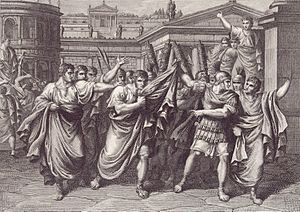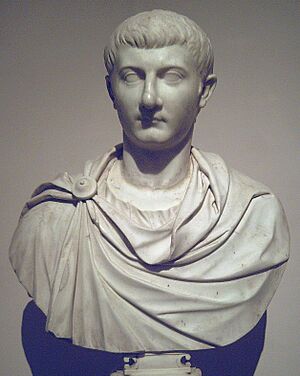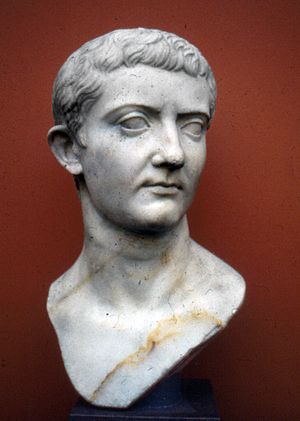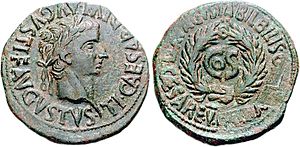Sejanus facts for kids
Quick facts for kids
Lucius Aelius Sejanus
|
|
|---|---|

Sejanus is arrested, an etching by G. Mochetti after drawing by Bartolomeo Pinelli
|
|
| Born | c. 20 BC Volsinii, Etruria |
| Died | October 18, 31 AD (aged 50) Rome |
| Allegiance | Roman Empire |
| Years of service | 14 AD – AD 31 |
| Rank | Praetorian prefect |
| Commands held | Praetorian Guard |
| Other work | Consul of the Roman Empire in 31 |
Lucius Aelius Sejanus (born around 20 BC, died October 18, AD 31) was a powerful Roman soldier. He was a close friend and trusted advisor to the Roman Emperor Tiberius. Sejanus started as a member of the Equites class, which was like the second-highest social group in Rome. He rose to become the leader of the Praetorian Guard, the emperor's special bodyguards. He commanded them from AD 14 until he was executed in AD 31.
The Praetorian Guard was first set up by Emperor Augustus. But Sejanus made many changes that turned this bodyguard unit into a very strong part of the Roman government. They became involved in public safety, managing the city, and even politics. These changes had a big impact on how the Roman Empire was run for a long time.
During the AD 20s, Sejanus slowly gained more power. He became very influential with Emperor Tiberius. He also removed people who might stand in his way, including the emperor's own son, Drusus Julius Caesar. In AD 26, Tiberius moved away to an island called Capri. This left Sejanus in charge of running the entire Roman Empire. For a while, Sejanus was the most powerful and feared person in Rome. But in AD 31, his career ended suddenly. He was arrested and executed because people suspected he was plotting against Tiberius. Many of his supporters were also arrested and punished.
Contents
Sejanus's Early Life
Sejanus was born around 20 BC in a place called Volsinii in Etruria. His family, the Seii, belonged to the Equites class. This was the second-highest social group in ancient Rome. His grandfather had connections with important families in the Roman Senate.
Sejanus's father, Lucius Seius Strabo, was also well-connected. Sejanus was later adopted into another important family, the Aelia gens. This is why his full name became Lucius Aelius Sejanus. His uncle, Junius Blaesus, was a respected military leader. He earned special honors for stopping a rebellion in Africa in AD 21.
Sejanus was married to a woman named Apicata. They had two sons, Strabo and Capito Aelianus, and a daughter named Junilla.
Rising to Power
Leading the Praetorian Guard
Sejanus's father, Strabo, became the leader of the Praetorian Guard sometime after 2 BC. This was one of the most powerful jobs a Roman knight could have. When Emperor Augustus died in AD 14, Tiberius became emperor. Sejanus was then made a leader of the Praetorian Guard alongside his father. This was the start of his rise to fame.
The Praetorian Guard was an elite group of soldiers. Emperor Augustus created them in 27 BC to protect the emperor and his family. But they did more than just guard. They also helped with daily tasks in the city, like keeping order and managing public services. Their presence reminded everyone, including the Senate, of the emperor's military strength. Augustus kept the guard spread out in different parts of the city. He also had two leaders for them.
In AD 15, Sejanus's father was sent to govern Egypt. This made Sejanus the only leader of the Praetorians. He then made big changes to the guard. In AD 20, he gathered all the scattered guard units into one large camp just outside Rome. This camp was called the Castra Praetoria. He also increased the number of guard units. Sejanus also chose all the officers himself. With these changes, Sejanus now had the full loyalty of about 12,000 soldiers. These soldiers were ready to follow his orders immediately. Emperor Tiberius also began to openly show the guard's strength in parades.
Rivalry with Drusus

As the Praetorian Prefect, Sejanus quickly became a trusted advisor to Emperor Tiberius. By AD 23, he had a lot of influence over the emperor's decisions. Tiberius even called Sejanus "Socius Laborum," meaning "my partner in my toils." Sejanus was given the rank of praetor, which was usually for higher-ranking Romans. A statue was even built in his honor. In the Roman Senate, his supporters were given important jobs.
However, this special position made other important Romans unhappy. Emperor Tiberius's son, Drusus Julius Caesar, especially disliked Sejanus. Their bad feelings went back to at least AD 15. That year, some Roman soldiers had rebelled. Drusus was sent to stop the rebellion, and Sejanus went with him. Drusus successfully calmed the soldiers, and the Praetorians helped clear out the rebels. Despite this success, the dislike between Drusus and Sejanus grew over the years.
Drusus was being prepared to take over as emperor after his father. But Sejanus was still the second most powerful man in the empire. He wanted even more power. In AD 20, Sejanus tried to connect with the imperial family. He planned for his daughter, Junilla, to marry the son of Claudius. But the boy died a few days later.
When that plan failed, Sejanus seemed to focus on removing Drusus. By AD 23, their rivalry was very intense. Drusus had even hit Sejanus during an argument. Drusus also complained that a "stranger" (Sejanus) was helping to run the government while the emperor's son was alive. Tiberius was getting old, so Drusus becoming emperor seemed likely soon. To protect his own position, Sejanus secretly plotted against Drusus. Drusus died on September 13, AD 23, under suspicious circumstances.
Gaining Control
Losing his son was a big blow to Tiberius. He had become less interested in being emperor over the years. He had even planned to share some of his duties with Drusus. With Drusus gone, Tiberius relied on Sejanus more than ever. He started to look at the sons of Germanicus (Tiberius's adopted son) as possible future emperors.
Germanicus had died in AD 19. After his death, his wife, Agrippina the Elder, returned to Rome with their six children. She became involved with senators who did not like Sejanus's growing power. Her relationship with Tiberius became difficult. She believed he was responsible for Germanicus's death. Tiberius's mother, Livia Drusilla, also disliked Agrippina. Sejanus saw Agrippina's sons as a threat to his power.
Sejanus tried again to marry into the imperial family. He had divorced his wife Apicata two years earlier. In AD 25, he asked to marry Livilla, Drusus's widow. He might have hoped this would make him a possible heir to the throne. But the emperor said no. Tiberius warned Sejanus that he was trying to become too powerful. Sejanus then changed his plans. He began to separate Tiberius from Rome. He made Tiberius more suspicious of Agrippina and the Senate. This led the emperor to move to the countryside in AD 26. Finally, Tiberius moved to the island of Capri, where he lived until he died in AD 37. Sejanus, with the Praetorian Guard, easily controlled all the information that went between Tiberius and Rome.
Even with Tiberius away, his mother Livia seemed to limit Sejanus's power for a while. But when Livia died in AD 29, everything changed. Sejanus began to target senators and wealthy Romans in the city. He removed anyone who might oppose him. This also helped fill the emperor's (and his own) treasury. Among those who suffered were Agrippina and two of her sons, Nero and Drusus. They were arrested and sent away in AD 30. They later died in exile under suspicious circumstances. Only Caligula, Germanicus's youngest son, survived Sejanus's actions. He moved to Capri to be with Tiberius in AD 31.
Sejanus's Downfall
The Emperor's Orders
In AD 31, Sejanus became a Roman consul alongside Tiberius. He also became engaged to Livilla. Tiberius had not been in Rome since AD 26. Senators and important Romans tried to gain Sejanus's favor as if he were the emperor. His birthday was celebrated publicly, and statues were built in his honor. With most of his political rivals gone, Sejanus felt very secure in his position.
Through years of clever plans and loyal service to the emperor, Sejanus had become the most powerful man in the Roman Empire.
But suddenly, at the end of AD 31, he was arrested. He was quickly executed, and his body was thrown down the Gemonian stairs. It's not completely clear what caused his downfall. Ancient writers disagree about whether Sejanus was truly plotting against Tiberius. Modern historians think it's unlikely Sejanus wanted to become emperor himself. If he had a plan, it might have been to rule as a guardian for Tiberius's grandson, Tiberius Gemellus, or perhaps for Caligula.
According to some ancient writers, Antonia, the mother of Livilla, warned Tiberius about Sejanus. She sent a letter to Capri, telling the emperor about the growing threat. Another account says Tiberius sent a letter from Capri ordering Sejanus's execution without a trial.
Other details suggest that Tiberius realized how much power Sejanus had taken in Rome. He decided to remove Sejanus but knew a direct order might cause a rebellion. So, Tiberius sent many confusing letters to the Senate. Some praised Sejanus, while others criticized him. Tiberius also announced he would return to Rome soon or that he was dying. He stepped down as consul, forcing Sejanus to do the same. He also gave a special honor to Caligula, which made people support Germanicus's family again. This confusion made many of Sejanus's followers unsure. They decided to stop openly supporting Sejanus until things were clearer.
When Tiberius saw that Sejanus's support was not as strong as he feared, he chose Naevius Sutorius Macro to replace Sejanus. Macro was the leader of the vigiles (Rome's police and fire department). On October 18, AD 31, Sejanus was called to a Senate meeting. He thought he was going to receive more honors. As he entered the Senate, Macro took control of the Praetorian Guard. Police officers surrounded the building. The senators at first congratulated Sejanus. But when the letter from Tiberius, which had started with unrelated topics, suddenly denounced him and ordered his arrest, Sejanus was immediately taken and imprisoned.
Execution and Aftermath
That same evening, the Senate met and quickly sentenced Sejanus to death. After his death, the Senate ordered a "damnatio memoriae." This meant his statues were torn down, and his name was removed from all public records and even coins. On October 24, Sejanus's oldest son, Strabo, was arrested and executed. His other children, Capito Aelianus and Junilla, were also executed in December of that year.
At first, Rome celebrated Sejanus's downfall. But soon, the city faced more trials. Tiberius punished everyone who had been connected to Sejanus or had been his friend. Many senators and important families were affected. Even high-ranking officials were not safe. Arrests and executions were now overseen by Naevius Sutorius Macro, who became the new leader of the Praetorian Guard. This political unrest continued until Tiberius died in AD 37. Caligula then became the new emperor.
Sejanus's Impact
The Praetorian Guard's Power
Sejanus's most important change was building the Castra Praetoria. This single camp made the Praetorian Guard a very powerful political force. From then on, the Guard was at the emperors' command. But the emperors also became dependent on the Praetorians. This was clear in AD 31 when Tiberius had to use the police force against his own guard. Even though the Praetorian Guard stayed loyal to the aging Tiberius, Sejanus had shown how much political power they could have. After Sejanus, no other Praetorian Prefect gained as much influence.
See also
 In Spanish: Sejano para niños
In Spanish: Sejano para niños
 | Kyle Baker |
 | Joseph Yoakum |
 | Laura Wheeler Waring |
 | Henry Ossawa Tanner |



